
by jlansber | Apr 21, 2018 | Faculty Focus
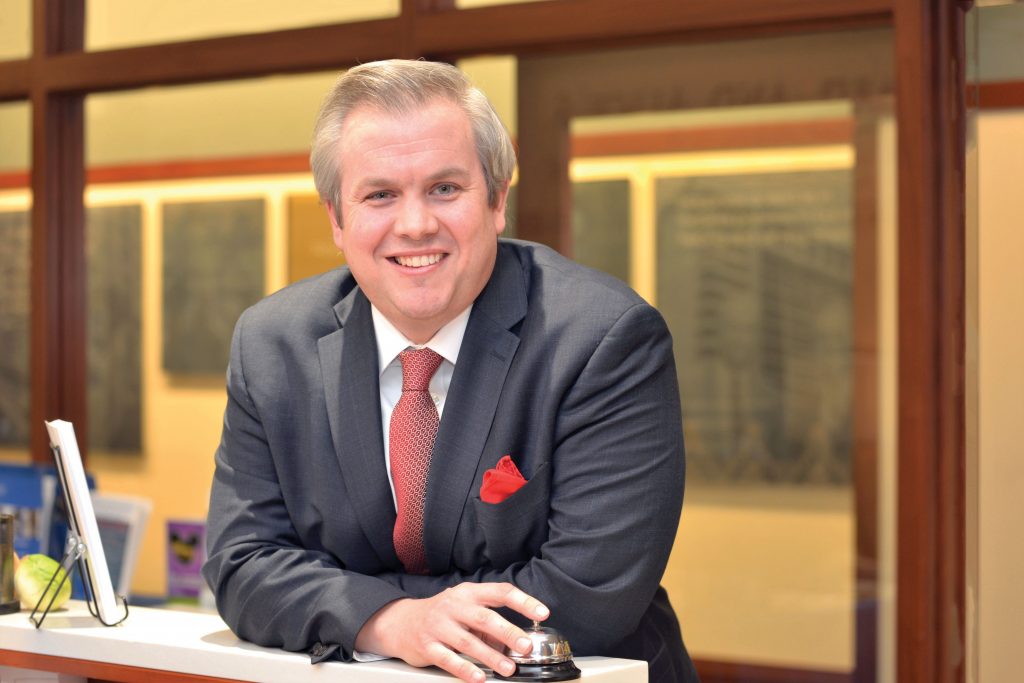
Nick Thomas
What differentiates us is what we do outside of the classroom.”
Nick Thomas’s transformation from a shy teen in Ellicott City, Md., to an outgoing, globe-trotting hospitality professor at DePaul began with a part-time job as a hotel bellman.
“I really loved the fact that it wasn’t a monotonous job,” Thomas recalls about working as a bellman and, later, front-desk agent at a Hilton hotel outside of Baltimore during high school. “I was very introverted, but when I would get behind the front desk of a hotel, I would get very extroverted. I could talk to people, and I enjoyed that. So, one day, I went to my manager and said, ‘I think I want to do this for my career.’”
Thomas finished high school and headed west to pursue a bachelor’s degree in hotel administration at the University of Nevada, Las Vegas (UNLV). He continued to work in hotel operations while in college and, after becoming a hotel employee trainer, developed a strong interest in hospitality teaching and research. At UNLV he also met his wife, Lisa, who shared his passion for the hospitality industry. The Thomases both completed master’s and PhD degrees in hospitality administration at UNLV, and they taught and held leadership roles at the university’s Singapore campus hospitality program.
In 2011, the couple joined the faculty of DePaul’s School of Hospitality Leadership. Nick directs the school’s J. Willard and Alice S. Marriott Foundation Center for Student Development and Engagement, and, since fall 2016, he has served as interim associate director of the school. The Thomases’ teaching continues to have global reach; they co-lead a hospitality study abroad course that visits Hong Kong, Singapore and Macau. This academic year, Nick also taught an online course that paired his DePaul students with hospitality students in China.
The School of Hospitality Leadership’s strength, Thomas says, is its emphasis on real-world learning and innovation. “I feel really confident that what we do inside the classroom is solid, it’s rigorous,” he says. “The students are acquiring knowledge and figuring out how to apply that knowledge. But I think what differentiates us is what we do outside of the classroom—how we do industry job recruitment, the kind of personalized career guidance that the (Marriott) center provides, the mentorships that faculty and industry offer students, and the half-dozen student clubs we have. For a program of our size, I think we have an extremely large footprint in the hospitality industry.”
The best part of his job, Thomas says, is seeing students transform into budding hospitality leaders through the school’s industry partnerships and hands-on learning.
“Getting emails from students saying ‘I got the job offer’ and ‘I got into the management training program that I want,’ that’s one of the most gratifying things in my career.”
By Robin Florzak | Photo by Kathy Hillegonds

by jlansber | Apr 20, 2018 | Scholarly Pursuits
Business Insights From Driehaus Faculty Research
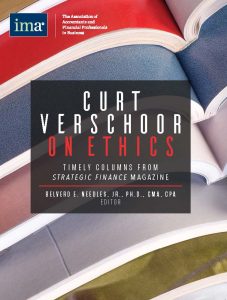 Curtis Verschoor’s background is as impressive as it is extensive. At DePaul, he is the Emeritus Ledger & Quill Research Professor in the School of Accountancy and Management Information Systems and honorary Senior Wicklander Research Fellow at the Institute for Business and Professional Ethics. He is a researcher, consultant, speaker and author of more than a dozen books. He has served as a senior corporate finance officer for several international public companies and accounting firms. But above all, Verschoor is a passionate advocate for business ethics.
Curtis Verschoor’s background is as impressive as it is extensive. At DePaul, he is the Emeritus Ledger & Quill Research Professor in the School of Accountancy and Management Information Systems and honorary Senior Wicklander Research Fellow at the Institute for Business and Professional Ethics. He is a researcher, consultant, speaker and author of more than a dozen books. He has served as a senior corporate finance officer for several international public companies and accounting firms. But above all, Verschoor is a passionate advocate for business ethics.
At an age when most people are enjoying retirement, he is still on top of his game after being named a thought leader on trustworthy business practices by Trust Across America. His latest book, “Curt Verschoor on Ethics,” compiles some of his most important and relevant articles about management accounting and finance best practices from his monthly column in Strategic Finance Magazine. DePaul Accountancy Professor Belverd Needles, one of the foremost experts in international financial reporting and auditing, served as the editor, helping to select articles for inclusion from hundreds that Verschoor has penned.
Ethics is universally important to everybody,” says Verschoor.
“That is why I started this column. It benefits organizations, as well as individuals.”
Verschoor has been writing an ethics column for Strategic Finance since 1999. Topics range from whistle-blowing, executive compensation and sustainability to ethical case studies involving companies such as Volkswagen, Uber and Toshiba. His focus remains topical; he recently explored how millennials’ approaches to ethics differ from those of other generations. While Strategic Finance targets financial professionals, employees in any industry can find value in ethics, Verschoor believes.
“In all my research, I’ve found that organizations with a strong ethical culture are more successful than those that have a weak organizational culture,” says Verschoor. “Companies with ethical cultures avoid reputational damage that comes from unethical practices and are usually better off financially. A strong ethical culture is a keystone or underlying core value of a well-managed, well-organized entity.”
Verschoor also hopes that students and academics will be able to use his collection of articles as a resource. “There is something that happens in everybody’s life every day that has ethical implications,” says Verschoor. “That’s why ethics is so important.”
By Andrew Zamorski

by jlansber | Apr 19, 2018 | Connections
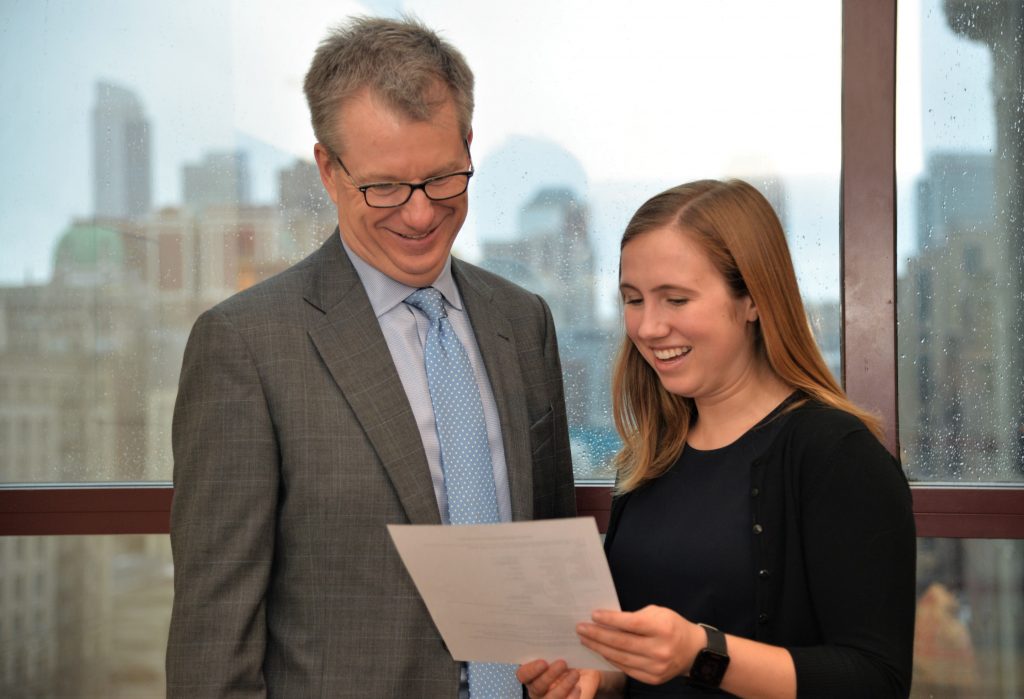
College graduates who, as students, were encouraged by mentors to pursue their hopes and dreams are twice as likely to feel engaged in their careers and fulfilled in their lives, according to a national Gallup-Purdue University survey.
That’s certainly the case for students, alumni and business professionals who participate in mentorships across the Driehaus College of Business. Business Exchange profiles three of these mentorships and how they have inspired both mentees and mentors.
Stories by Andrew Zamorski
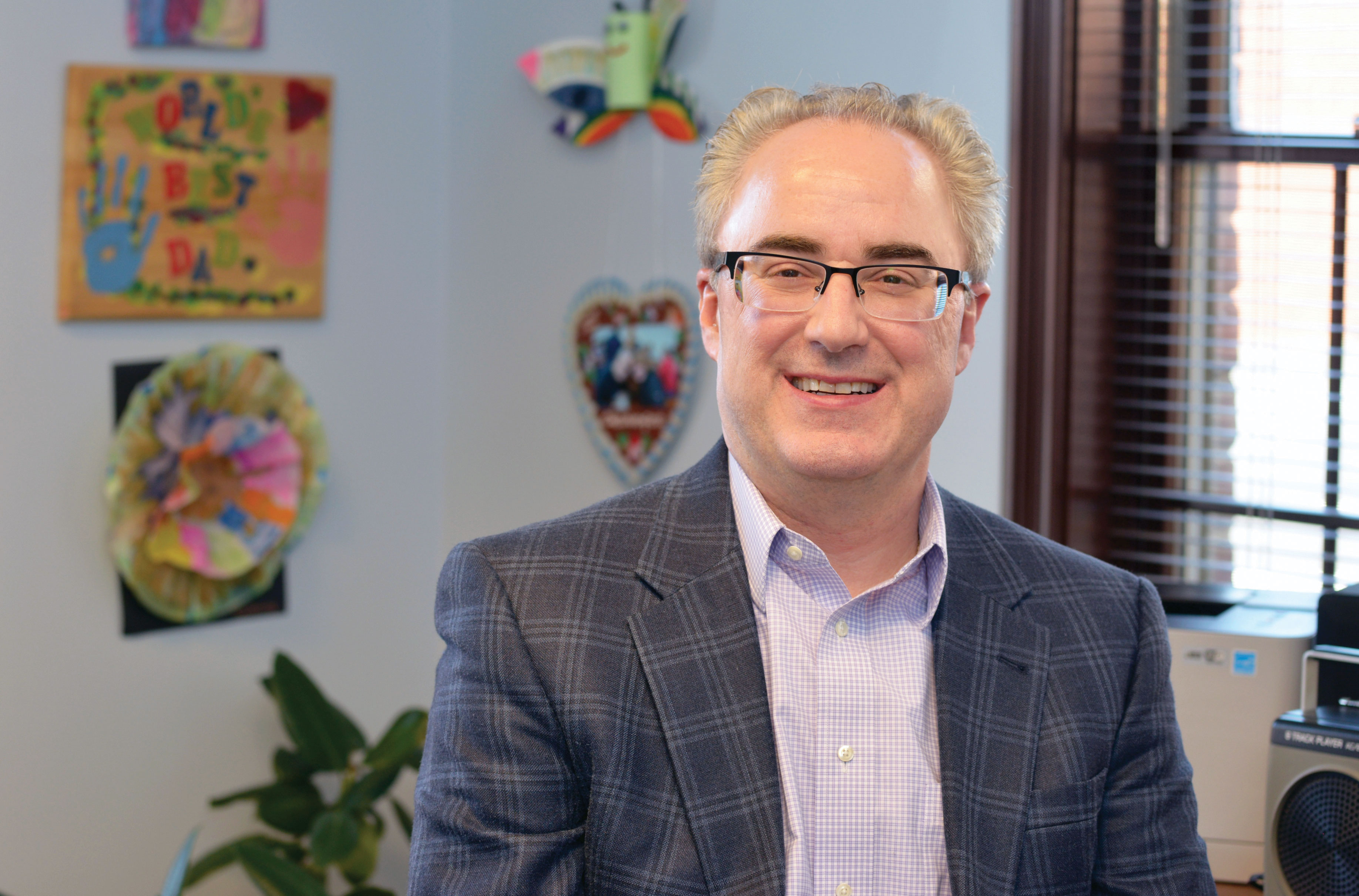
by jlansber | Apr 18, 2018 | Giving Back
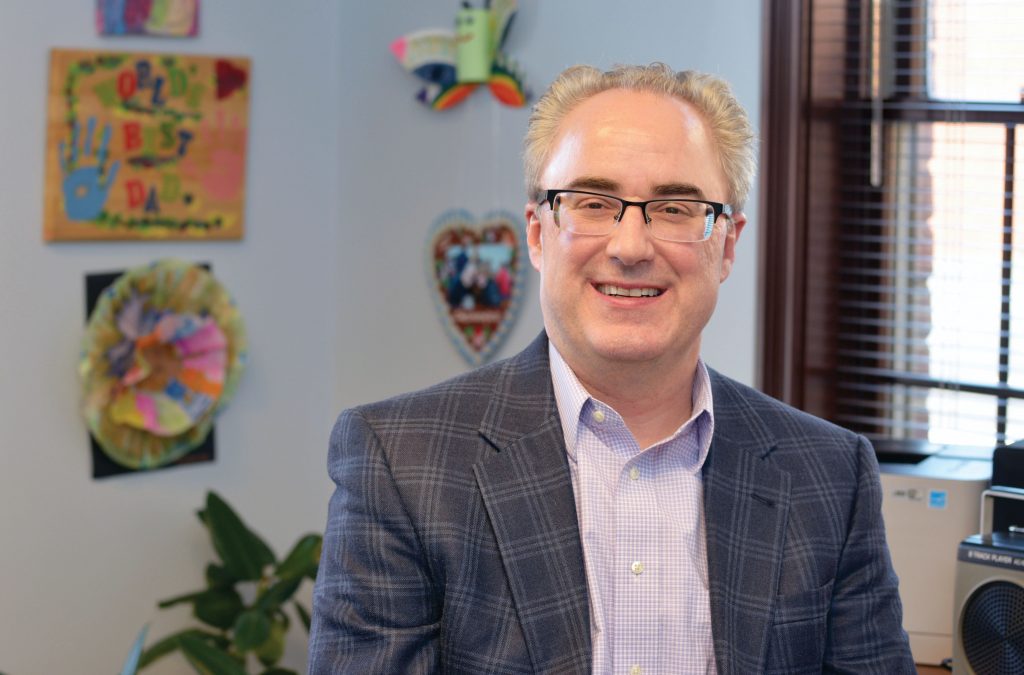
Chris McCauley (MAC ’87)
In 2000, Chris McCauley (MAC ’87) decided it was time to assess where he was in his career. He had graduated from DePaul 13 years before with a master’s degree in accounting and then began his career as an auditor with accounting giant Coopers & Lybrand (now PwC). He then moved on to Quaker Oats and later to Ameritech, in the benefits group.
He found that something new was calling to him.
“As much as I like working with numbers, I like working with people more,” McCauley says.
Now a Certified Financial Plannert with the Strategic Planning Group Inc. in Indianapolis, McCauley looks back on the first half of his career as great preparation for his current role. “I can quickly understand a person’s situation, and with an accounting background, I hit the ground running with their tax situation.”
McCauley came to DePaul as a transfer student, attracted to the outstanding reputation of the business school’s accountancy program. “DePaul is very open-minded about accepting transfer students’ coursework from other schools. I paid for my own education, so I was particularly grateful about that.”
McCauley, a native of Will County, just southwest of Chicago, enjoyed being away from home. “Living in Lincoln Park, getting on the ‘L,’ was very exciting.” Any anxieties he might have had were dispelled by Bro. Leo V. Ryan, C.S.V, then dean of the business school. “He got to know me by my first name. He was welcoming that way and just made me feel I made the right choice in DePaul.”
McCauley also connected with DePaul’s Vincentian mission. “I got a great deal out of those courses in religion and philosophy. They teach you how to be open-minded and think.” McCauley lives the mission not only by helping his clients, but also by serving on the board of a nonprofit that helps victims of violence and their families, and volunteering at his church and local Catholic school.
McCauley and his wife, Clarice (JD ’98), recently became members of The 1898 Society, an annual giving program DePaul founded for alumni who want to increase their commitment to the university and its students with an annual donation of at least $1,898. “What kind of got us was that 40 percent of the students are first-generation college students,” McCauley says. Helping financially challenged students with the ambition to make better lives for themselves is the McCauleys’ way of saying “thank you” to DePaul.
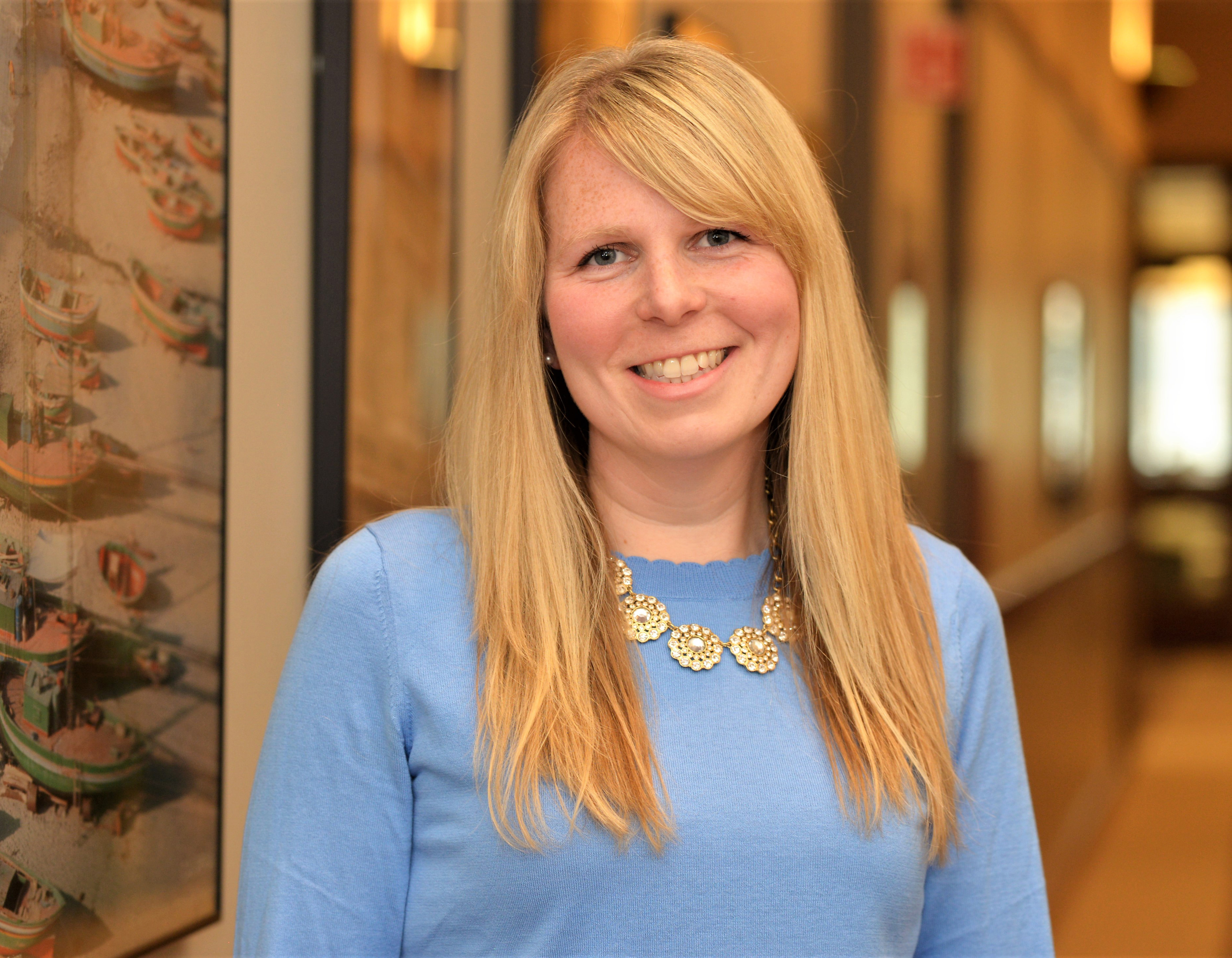
by jlansber | Apr 18, 2018 | Online Extras
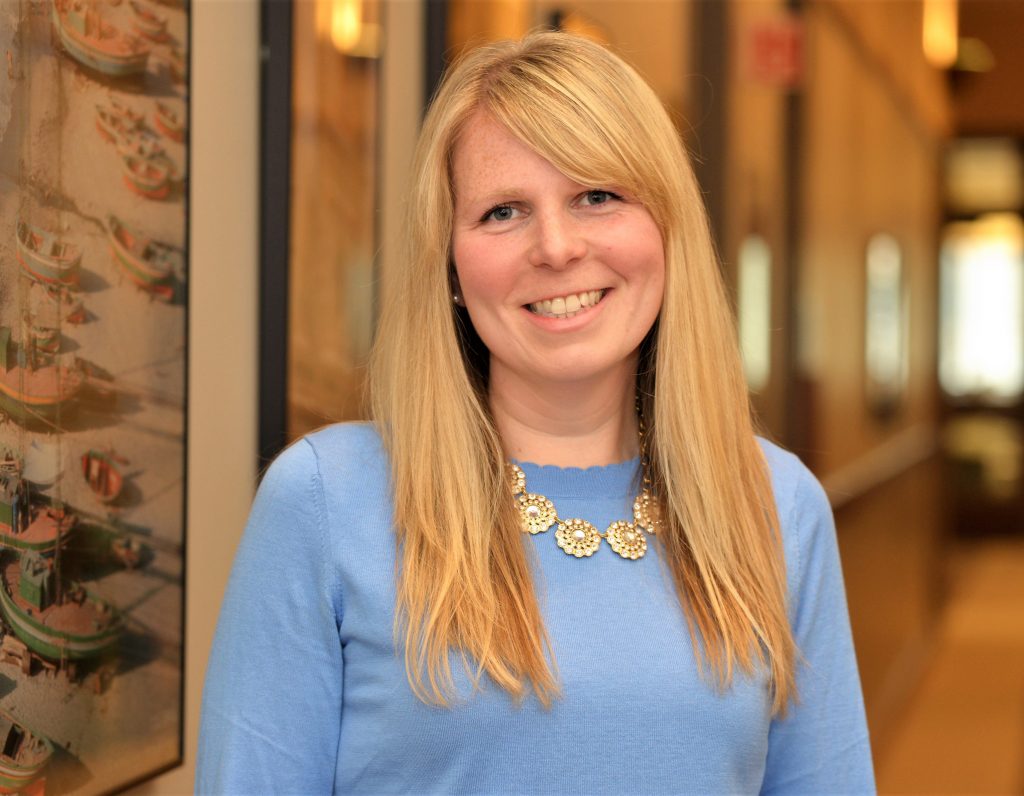
Erica Thewis previously worked as a baker and business owner of Pistache French Pastry and is now pursuing a master’s degree in human resources. Photo by Kathy Hillegonds.
Erica Thewis is taking a nontraditional route to land her dream job. The one-time culinary creationist sifted through both tasty and unappetizing career choices before she realized that her true passion was helping people and organizations excel. Now, studying for her master’s degree in human resources (MSHR) at DePaul’s Kellstadt Graduate School of Business, Thewis hopes to find her metaphorical elusive black truffle—a job that combines her new career path with morsels of her multidisciplinary skills and talents.
Associate Professor of Management Jaclyn Jensen, the faculty director of DePaul’s MSHR program, understands the challenges that Thewis and others with multidisciplinary educations and experience face when looking for a job in their desired career.
“As much as we talk about the need to be diverse and open to different backgrounds and perspectives, sometimes recruiters can be too quick to judge a candidate,” says Jenson. “When you have two candidates side by side and one has come up with matching degrees, and one has come up through a different functional path, the person who has a more traditional background may get the edge.”
Jensen notes that there are ways to address employers’ hesitation to hire a candidate with a wide-ranging education and career background. She recommends building a network of contacts in the current desired field and connecting with mentors. The mentors are especially important because they can provide an insider’s knowledge of the industry and give advice on how to approach applying for jobs. Jensen also recommends building business knowledge through continuing education courses, certificate programs or getting an advanced degree. As for candidates like Thewis who are in the MSHR program, Jensen recommends seeking an internship so that they can receive on-the-job learning while studying in the classroom.
“Something that all applicants, whether traditional or multidiscipline, will need in order to be effective in their new role is business acumen,” says Jensen. “This is being able to have a clear understanding of how a business works. This includes a sense of how your organization makes money, its goals and strategy, and how your technical expertise plays a role.” Jensen notes that business acumen can be learned through experience, but it can also be supplemented through additional study. She also stresses that multidisciplinary-background candidates highlight their transferable skills and business acumen to help land a job in their new field.
Gathering Ingredients for Success
 Thewis, who has undergraduate degrees in art history and Italian and an associate’s degree in baking and pastry making, has impressive business acumen. While living in Memphis, Thewis opened Pistache French Pastry from her home, where she made fresh macaróns, chocolates and petits fours. She sold her baked goods at local farmer’s markets, on the online marketplace Etsy and through catering companies. After a few newspaper profiles about her venture and great word-of-mouth, Thewis hit it big in the Memphis food scene, which made her job both sustainable and fulfilling.
Thewis, who has undergraduate degrees in art history and Italian and an associate’s degree in baking and pastry making, has impressive business acumen. While living in Memphis, Thewis opened Pistache French Pastry from her home, where she made fresh macaróns, chocolates and petits fours. She sold her baked goods at local farmer’s markets, on the online marketplace Etsy and through catering companies. After a few newspaper profiles about her venture and great word-of-mouth, Thewis hit it big in the Memphis food scene, which made her job both sustainable and fulfilling.
“Pistache French Pastry truly was a learn-as-you-go experience,” says Thewis. “I discovered everything you needed to know about how to run a business. This was a smaller market, which gave me the opportunity to make mistakes and to learn from them. I also learned that I wanted to be a part of the business and not just on a pastry assembly line.”
Personal reasons brought Thewis back to Chicago where she decided to change professions. After searching for jobs online that infused her interests, Thewis became interested in the job postings for human resource roles.
“Baking is a solitary life, but I want to engage with people,” says Thewis.
I want to help people find their passion and get to a place where they feel valued at work. I also wanted to work in a business that has a strategy and goals that isn’t about the number of cakes that get iced.”
Mix in New Passions
Thewis applied to every HR job she found, but without any nibbles on her applications, she decided to look into an advanced business degree. While attending an info session at DePaul, she sparked a conversation with Anthony Cuellar, assistant director of recruiting for DePaul’s Kellstadt Graduate School of Business, who also has a multidisciplinary background with a bachelor’s degree in audio arts and acoustics and a master’s in counseling.
“Many students think that if they don’t have an undergraduate business degree, they are not qualified for graduate business school,” says Cuellar. “That is not the case.
Many times multidisciplinary backgrounds provide businesses transferable skills like conflict management, leadership and communication—skills the mean something in the real world.”
Cuellar also notes that DePaul has been seeing a sizable increase in business school applications from students with non-traditional backgrounds as well as career changers. In fact, DePaul’s full-time MBA student cohort entering in fall 2018 has applicants who are military veterans, healthcare practitioners, lawyers and other non-business careerists.
“Students coming from non-business backgrounds have an outside-looking-in perspective,” observes Cuellar. “The more a student is removed from their bachelor’s degree, the more professional experience and transferable skills they bring into the classroom. They are bringing different perspectives of leadership.”
Bake to Perfection
 Thewis is eager to take more human resources courses and to integrate all of the unique ingredients of her background into her new career, including her experiences of owning a business and studying art history.
Thewis is eager to take more human resources courses and to integrate all of the unique ingredients of her background into her new career, including her experiences of owning a business and studying art history.
“Art history is about analyzing and looking at everything critically,” says Thewis. “I bring those skills into the business world and try to look for the whole story, not just a solution to a problem. I am able to bring in real examples from owning Pistache into my business courses. I also like to consider the human aspect of a business and the way that people matter, which is why I am eager to get into the HR curriculum.”
Jensen agrees with Cuellar that multidisciplinary backgrounds bring new perspectives and transferable skills to the business world, but also recommends that non-business students take business courses.
“Businesses value the critical thinking skills and communication abilities and even the creativity of those who graduate with a liberal arts degree,” says Jensen. “A business degree offers those with a multidisciplinary background an opportunity to apply those skills in a business context while also showing an employer, through their new degree, that they have an appreciation for all the functional areas of business, like management, finance, economics and others. It also shows that the candidate appreciates that there is technical knowledge and skills associated with each of those different disciplines.”
Changing careers for those with a multidisciplinary background can be as tricky as nailing a perfect soufflé, but by mixing together the transferable skills from a diverse background with business acumen and education can prove to be a recipe for success.
By Andrew Zamorski











